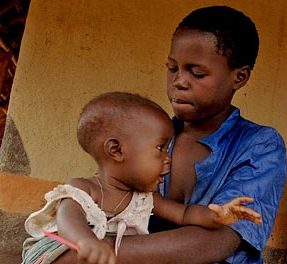Nairobi — In Ethiopia, girls are abducted on their way to school, raped and then married to their captors.
In Ghana, they are married to traditional priests and become "slaves to the gods" to pay for their family's sins.
In Cameroon, girls are promised in marriage to settle debts while still in the womb.
"There are different forms of child marriage but all these different forms have one common point, which is the girl doesn't have a voice," Francoise Kpeglo Moudouthe, Africa officer for the advocacy groupGirls Not Brides, told Thomson Reuters Foundation.
"Her status in the community is so low that she doesn't even have a right to speak about this issue: if she wants to marry, when she wants to marry and who she wants to marry."
GIRLS AS COMMODITIES
On July 22, the Girl Summit in London will bring together governments, charities, activists and business to declare their intention to end child marriage in one generation.
Fifteen of the 20 countries with the highest rates of child marriage are in Africa, and 39 percent of the continent's girls are married before the age of 18.
Niger has the highest rate, with 75 percent of girls married before they are 18.
Moudouthe believes that the summit's ambitious goal of ending child marriage in a generation can be achieved.
"The most important thing is to change the way that girls are viewed. For me, that really is the underlying problem," she said. "Girls are not commodities. We cannot sell them into marriage. We cannot decide what to do with their bodies."
Child marriage is a tradition that is practised to preserve a girl's chastity, to strengthen ties between families and to cope, as a response to poverty. In many African countries, parents receive a bride price from the groom's family when their daughter marries, and are relieved of the burden of providing for her.
Engagement with the 70 million child brides around the world is critical to breaking the cycle.
"It's an inter-generational issue," Moudouthe said. "Girls who are forced into marriage, and are not made aware of the unfairness of the situation, are likely to have daughters who also become child brides."
In Ethiopia, Moudouthe met a 13-year-old girl breastfeeding her second baby. She had been married at the age of six or seven.
The teenage mother was attending a discussion club for child brides called Meserete Hiwot, meaning "base of life" in Amharic. The majority of mothers who attend have not completed primary school and benefit from learning about assertiveness, hygiene, financial literacy and reproductive health.
"It is so important because girls are confined in marriage. They are usually not allowed out of the house," said Moudouthe. "Not only do they learn about their rights but also how to handle the day to day challenges. How do you know when your child is sick and what can you do about it?"
STRATEGIES
Other strategies that experts say can help to end child marriage are supporting girls to remain in school, enforcing laws banning child marriage, teaching girls skills so that they can earn money for their families and educating communities about the negative impacts of the practice.
Girls Not Brides is campaigning for ending child marriage to be made one of the Sustainable Development Goals being drawn up to succeed the Millennium Development Goals (
"When you look at the obstacles [to achieving the MDGs], child marriage is a common one in that it affects six of the eight MDGs," Moudouthe said.
The world cannot achieve universal primary education if girls drop out of school to get married. Nor can extreme poverty be eradicated when child marriage perpetuates poverty.
The third goal, gender equality, is directly challenged by child marriage.
Similarly, it is hard to reduce child mortality and improve maternal health when young girls get pregnant and give birth before their bodies are mature.
"The children of girls who had them below the age of 15 are 60 percent more likely to die within their first year," Moudouthe said. "And girls who are pregnant before the age of 15 are five times more likely to die or be injured during their pregnancy or childbirth [than older women]."
The sixth goal linked to child marriage is combating HIV/AIDS, which affects child brides more than unmarried sexually active teenagers.
"They are married to men who are very often much older and who have sexual experience already, and with whom they have very little capacity to negotiate for safe sexual practices," Moudouthe said.
Editing by Tim Pearce: timothy.pearce@thomsonreuters.com
What: Unicef to Co-Host an International Summit With the UK Government to Rally a Growing Movement to End Female Genital … see more »
Read the original of this report on AlertNet Climate, the Thomson Reuters Foundation's daily news website on the human impacts of climate change.


